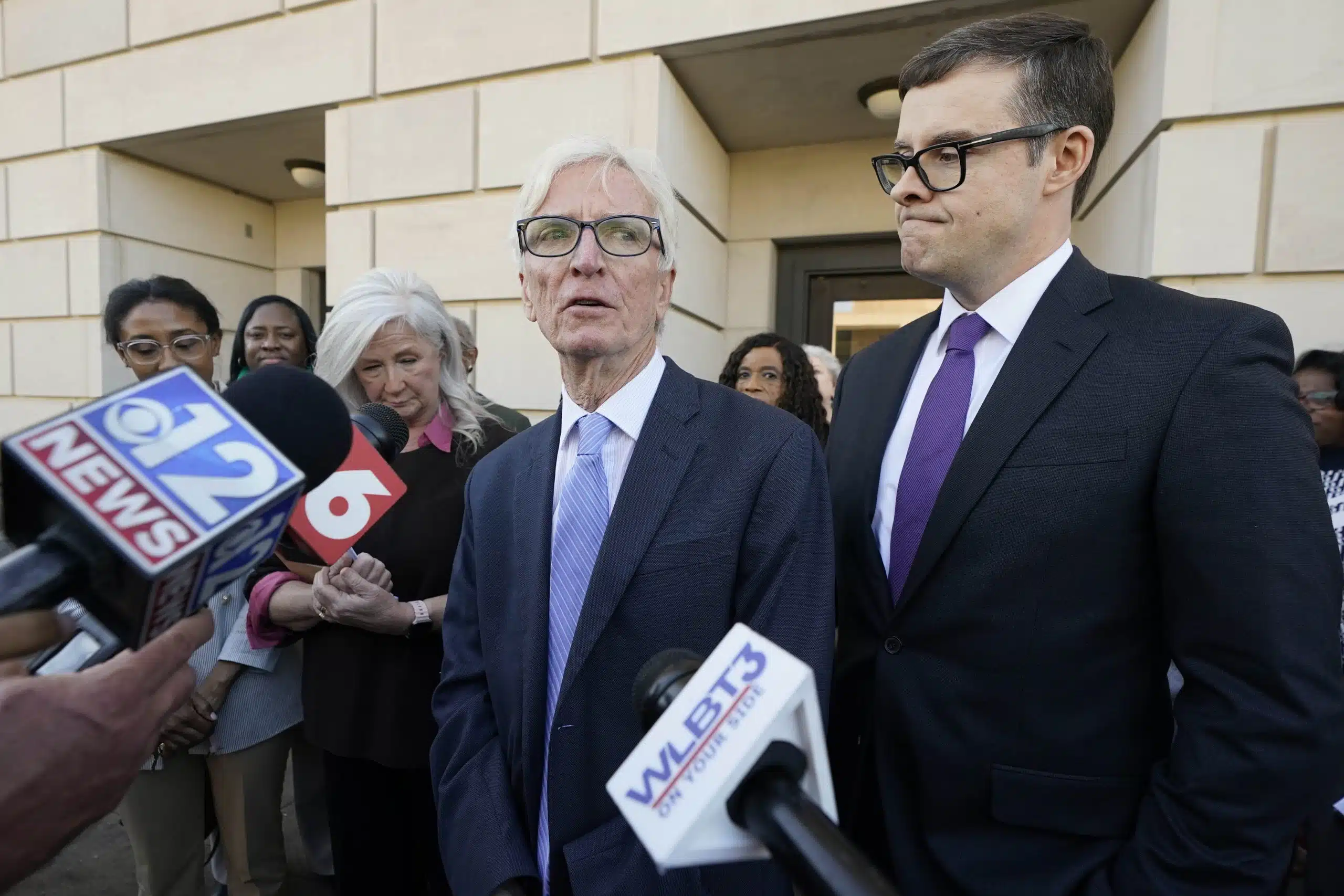Mississippi Today
Supreme Court hears oral arguments in lawsuit challenging public money to private schools

Attorneys for public school advocates said in oral arguments Tuesday before the Mississippi Supreme Court that the state constitutional provision that prevents public funds from going to private schools is “ironclad.”
Attorneys Rob McDuff and Will Bardwell, representing Parents for Public Schools, said at the time of the writing of the 1890 Mississippi Constitution that public funds were being spent on private schools and the framers of the constitution sought to prevent that from occurring. Section 208 of the constitution says, in part, that public funds shall not be provided to any school “not conducted as a free school.”
The Parents for Public Schools organization filed a lawsuit in 2022 challenging the constitutionality of a $10 million state legislative appropriation made to the Midsouth Association of Independents Schools.
“Section 208 expresses a simple principle: public money shall go to public schools,” McDuff told a three-justice panel of the nine-member Supreme Court on Tuesday.
Only justices Leslie King of the Central District, Robert Chamberlin of the Northern District and David Ishee of the Southern District heard the oral arguments, though it is possible that all nine justices will rule on the issue. The case was appealed to the Supreme Court by state Attorney General Lynn Fitch after Hinds County Chancellor Crystal Wise Mastin ruled the Legislature’s action was unconstitutional.
READ MORE: Lawmakers spent public money on private schools. Does it violate the Mississippi Constitution?
Justin Matheny of the Attorney General’s Office argued Tuesday that it was OK for the Legislature to appropriate the money to the state’s private schools for infrastructure repairs because the funds were not state money but were part of the more than $1 billion in federal funds provided to the state for COVID-19 relief.
Additionally, Matheny pointed out the funds were not directly appropriated to the private schools by the Legislature, but to the state Department of Finance and Administration with the instruction to send the money to the private schools in the form of grants. King of the Central District, who presided over the three-justice panel, told Matheny that it was the custom of the Legislature to appropriate most funds to state agencies with instructions to provide the money to the entity that the Legislature intended to receive the funds.
Matheny also argued that the Parents for Public Schools was not directly harmed by the Legislature’s action so the advocacy group did not have standing to bring the case. Bardwell argued that the group as taxpayers, including taxpaying parents of public school students, did have standing.
King asked Matheny if he was arguing that sometimes there is no one with standing to file a lawsuit challenging a legislative action as unconstitutional.
Matheny replied, “It is possible and it should not bother anyone” since no one was harmed by the legislative action. He said the appropriated money was not state funds reserved for public schools, so no one was harmed.
Chamberlin then posed a hypothetical to McDuff: If Congress earmarked money specifically for private schools, would the Mississippi Legislature be able to appropriate it to the private schools then? McDuff replied the Legislature would not under Section 208 of the state constitution. Of course, under Chamberlin’s hypothetical, Congress could bypass the Legislature and send money directly to the private schools just as it did to public schools as part of some of the COVID-19 relief funds.
PODCAST: Will Mississippi Supreme Court stop public funds from going to private schools?
The money the Legislature appropriated to the private schools in 2022 was part of a pot of federal discretionary funds that were sent to the states to be used in numerous areas, including on infrastructure improvements. But since the money was public, Bardwell and McDuff argued, in Mississippi it could not go to private schools.
Buck Dougherty of the Liberty Justice Center argued that the private schools should be allowed to intervene in the case. The private schools were not allowed to intervene in the lower Hinds County Chancery Court. Martin, the judge in the original case, ruled that the request to intervene was made too late.
In addition, Dougherty argued that Section 208 of the state constitution violates the U.S. Constitution. He said that constitutional provisions in various states prohibiting public money from going to private religious schools have been ruled as unconstitutional by the U.S. Supreme Court.
But Bardwell pointed out that the issue is not public money going to religious schools.
He said the U.S. Supreme Court has ruled repeatedly that “the state is not obligated to fund private schools.” But if a state is providing funds to a private school, it cannot discriminate against religious schools. The key difference, Bardwell said, is that Mississippi Constitution’s Section 208 prohibited public funds from going to all private schools.
Numerous people on both sides of the issue attended the Tuesday oral arguments in downtown Jackson.
READ MORE: Politicians want private school vouchers, but not a vote to amend constitution to allow them
This article first appeared on Mississippi Today and is republished here under a Creative Commons license.
Mississippi Today
After 30 years in prison, Mississippi woman dies from cancer she says was preventable
Behind Bars, Beyond Care:
A Mississippi Today investigation into suffering, secrecy and the business of prison health care
Susie Balfour, diagnosed with terminal breast cancer two weeks before her release from prison, has died from the disease she alleged past and present prison health care providers failed to catch until it was too late.
The 64-year-old left the Central Mississippi Correctional Facility in December 2021 after more than 30 years of incarceration. She died on Friday, a representative for her family confirmed.
Balfour is survived by family members and friends. News of her passing has led to an outpouring of condolences of support shared online from community members, including some she met in prison.
Instead of getting the chance to rebuild her life, Balfour was released with a death sentence, said Pauline Rogers, executive director of the RECH Foundation.
“Susie didn’t just survive prison, she came out fighting,” Rogers said in a statement. “She spent her final years demanding justice, not just for herself, but for the women still inside. She knew her time was limited, but her courage was limitless.”
Last year, Balfour filed a federal lawsuit against three private medical contractors for the prison system, alleging medical neglect. The lawsuit highlighted how she and other incarcerated women came into contact with raw industrial chemicals during cleaning duty. Some of the chemicals have been linked to an increased risk of cancer in some studies.
The companies contracted to provide health care to prisoners at the facility over the course of Balfour’s sentence — Wexford Health Sources, Centurion Health and VitalCore, the current medical provider — delayed or failed to schedule follow-up cancer screenings for Balfour even though they had been recommended by prison physicians, the lawsuit says.
“I just want everybody to be held accountable,” Balfour said of her lawsuit. “ … and I just want justice for myself and other ladies and men in there who are dealing with the same situation I am dealing with.”
Rep. Becky Currie, who chairs the House Corrections Committee, spoke to Balfour last week, just days before her death. Until the very end, Balfour was focused on ensuring her story would outlive her, that it would drive reforms protecting others from suffering the same fate, Currie said.
“She wanted to talk to me on her deathbed. She could hardly speak, but she wanted to make sure nobody goes through what she went through,” Currie said. “I told her she would be in a better place soon, and I told her I would do my best to make sure nobody else goes through this.”
During Mississippi’s 2025 legislative session, Balfour’s story inspired Rep. Justis Gibbs, a Democrat from Jackson, to introduce legislation requiring state prisons to provide inmates on work assignments with protective gear.
Gibbs said over 10 other Mississippi inmates have come down with cancer or become seriously ill after they were exposed to chemicals while on work assignments. In a statement on Monday, Gibbs said the bill was a critical step toward showing that Mississippi does not tolerate human rights abuses.
“It is sad to hear of multiple incarcerated individuals passing away this summer due to continued exposure of harsh chemicals,” Gibbs said. “We worked very hard last session to get this bill past the finish line. I am appreciative of Speaker Jason White and the House Corrections Committee for understanding how vital this bill is and passing it out of committee. Every one of my house colleagues voted yes. We cannot allow politics between chambers on unrelated matters to stop the passage of good common-sense legislation.”
The bill passed the House in a bipartisan vote before dying in the Senate. Currie told Mississippi Today on Monday that she plans on marshalling the bill through the House again next session.
Currie, a Republican from Brookhaven, said Balfour’s case shows that prison medical contractors don’t have strong enough incentives to offer preventive care or treat illnesses like cancer.
In response to an ongoing Mississippi Today investigation into prison health care and in comments on the House floor, Currie has said prisoners are sometimes denied life saving treatments. A high-ranking former corrections official also came forward and told the news outlet that Mississippi’s prison system is rife with medical neglect and mismanagement.
Mississippi Today also obtained text messages between current and former corrections department officials showing that the same year the state agreed to pay VitalCore $100 million in taxpayer funds to provide healthcare to people incarcerated in Mississippi prisons, a top official at the Department remarked that the company “sucks.”
Balfour was first convicted of murdering a police officer during a robbery in north Mississippi, and she was sentenced to death. The Mississippi Supreme Court reversed the conviction in 1992, finding that her constitutional rights were violated in trial. She reached a plea agreement for a lesser charge, her attorney said.
As of Monday, the lawsuit remains active, according to court records. Late last year Balfour’s attorneys asked for her to be able to give a deposition with the intent of preserving her testimony. She was scheduled to give one in Southaven in March.
Rogers said Balfour’s death is a tragic reminder of systemic failures in the prison system where routine medical care is denied, their labor is exploited and too many who are released die from conditions that went untreated while they were in state custody.
Her legacy is one RECH Foundation will honor by continuing to fight for justice, dignity and systemic reform, said Rogers, who was formerly incarcerated herself.
This article first appeared on Mississippi Today and is republished here under a Creative Commons Attribution-NoDerivatives 4.0 International License.
The post After 30 years in prison, Mississippi woman dies from cancer she says was preventable appeared first on mississippitoday.org
Note: The following A.I. based commentary is not part of the original article, reproduced above, but is offered in the hopes that it will promote greater media literacy and critical thinking, by making any potential bias more visible to the reader –Staff Editor.
Political Bias Rating: Center-Left
This article presents a critical view of the Mississippi prison health care system, highlighting systemic failures and medical neglect that led to the death of a formerly incarcerated woman. The tone and framing focus on social justice issues, prisoner rights, and the need for government accountability and reform, which align with Center-Left values emphasizing government responsibility for vulnerable populations. While the article is largely investigative and fact-based, its emphasis on advocacy for reform, criticism of privatized prison health contractors, and highlighting bipartisan legislative efforts suggest a Center-Left leaning perspective rather than neutral reporting.
Mississippi Today
FBI concocted a bribery scheme that wasn’t, ex-interim Hinds sheriff says in appeal
Former interim Hinds County sheriff Marshand Crisler is appealing bribery and ammunition charges stemming from his 2021 campaign, arguing that the federal government played on his relationship with a former supporter to entrap him.
Crisler had asked Tonarri Moore, who donated to past campaigns, for a financial contribution for the sheriff’s race. Moore said he would donate if Crisler helped with several requests. Without the previous relationship, Crisler would not have acted, his attorney argues, and Crisler had no reason to believe he was being bribed.
“The government, having concocted a bribery scheme to entrap Crisler, then had to contrive a corresponding quid pro quo to support the scenario with which to entrap him,” attorney John Holliman wrote in a Saturday appellant brief.
Crisler is asking the U.S. 5th Circuit Court of Appeals to reverse his conviction and render its own rulings on both counts.
He was convicted in federal court in November after a three-day trial and sentenced earlier this year to 2 ½ years in prison. Crisler is serving time in FCI Beckley in West Virginia.
The day before Crisler reached out to Moore to ask for support for his campaign for sheriff, Drug and Enforcement Administration agents raided Moore’s home and found guns and drugs. An FBI agent called to the scene looked through Moore’s phone and saw Crisler had called.
According to the appellant brief, the agent asked Moore what Crisler would do if offered money, and if Moore was bribing him. Moore said he wasn’t bribing Crisler, and the agent asked if Moore would do it.
At that time, there weren’t reasonable grounds to start a bribery investigation into Crisler, his attorney argues, nor was there reason to believe he was seeking a bribe.
Moore agreed to become an informant for the FBI, in exchange for the government not prosecuting him for the guns and drugs.
The FBI fitted him with a wire to record Crisler during meetings, which began that day. The meetings included one inside Moore’s night club and a cigarette lounge in Jackson. Agents provided Moore with the $9,500 he gave to Crisler between September and November 2021.
Crisler’s 2023 indictment came as he campaigned again for sheriff and months before the primary election. He remained in the race and lost to the incumbent who he faced in 2021.
At trial, the government argued the exchange of money were attempts to bribe because Moore made several requests of Crisler: to move his cousin to a different part of the Hinds County Detention Center, to get him a job in the sheriff’s office and for Crisler to let Moore know if law enforcement was looking into his activities.
In closing arguments, Assistant U.S. Attorney Charles Kirkham pointed to examples of quid pro quo in recordings, including one where Moore said to Crisler, “You scratch my back, I scratch yours” and Crisler replied “Hello!” in a tone that the government saw as agreement.
The appellant’s brief argues that without Moore’s requests, the government lacked a way to show quid pro quo, a requirement of bribery charge: that Crisler committed or agreed to commit an official act in exchange for funds.
Moore also asked Crisler to give him bullets despite being a convicted felon, which is prohibited under federal law. The brief notes how the government directed Moore to come up with a story for needing the bullets and to ask Crisler to give them to him.
In response, Crisler told Moore he could buy bullets at several sporting goods stores. Moore said they ran out, and eventually Crisler gave him bullets.
Crisler also argues that the government prosecuted routine political behavior. Specifically, accepting campaign donations is not illegal, and can not constitute bribery unless there is an explicit promise to perform or not perform an official act in exchange for money.
“Our political system relies on interactions between citizens and politicians with requests being made for this or that which is within the power of the elected official to do,” the brief states. “This does not constitute a bribery scheme. It is the normal working of our political system.”
This article first appeared on Mississippi Today and is republished here under a Creative Commons Attribution-NoDerivatives 4.0 International License.
The post FBI concocted a bribery scheme that wasn’t, ex-interim Hinds sheriff says in appeal appeared first on mississippitoday.org
Note: The following A.I. based commentary is not part of the original article, reproduced above, but is offered in the hopes that it will promote greater media literacy and critical thinking, by making any potential bias more visible to the reader –Staff Editor.
Political Bias Rating: Center-Right
The article presents the legal appeal of former interim Hinds County sheriff Marshand Crisler with a focus on his argument that the FBI orchestrated an entrapment scheme. The language is largely factual and centers on the defense’s claims and legal standards for bribery, emphasizing normal political behavior versus illegal conduct. While the article reports on the government’s position, it gives significant space to Crisler’s defense and critiques of federal prosecution tactics. This framing, highlighting skepticism toward federal law enforcement and emphasizing the defense perspective, suggests a slight center-right leaning, reflecting a cautious stance on government overreach without overt ideological language.
Mississippi Today
Political stumping mild at Neshoba County Fair
Mississippi Today’s politics team recaps the 2025 Neshoba County Fair. This year’s political speaking lacked some of the fire and brimstone of big election years, but state leaders laid out some major policy plans sure to dominate debate in the next legislative session.
This article first appeared on Mississippi Today and is republished here under a Creative Commons Attribution-NoDerivatives 4.0 International License.
The post Political stumping mild at Neshoba County Fair appeared first on mississippitoday.org
-
News from the South - Texas News Feed4 days ago
Rural Texas uses THC for health and economy
-
News from the South - Texas News Feed6 days ago
Yelp names ‘Top 100 Sandwich Shops’ in the US, several Texas locations make the cut
-
News from the South - Kentucky News Feed6 days ago
Harrison County Doctor Sentenced for Unlawful Distribution of Controlled Substances
-
News from the South - Missouri News Feed7 days ago
Co-founder of whites-only group speaks on previous homestead stabbing
-
News from the South - Texas News Feed6 days ago
Released messages show Kerrville officials’ flood response
-
News from the South - Louisiana News Feed6 days ago
Residents along Vermilion River want cops to help prevent land loss
-
News from the South - Alabama News Feed5 days ago
Decision to unfreeze migrant education money comes too late for some kids
-
News from the South - West Virginia News Feed6 days ago
‘Good government’ group urges blue states to back away from a redistricting arms race

















































